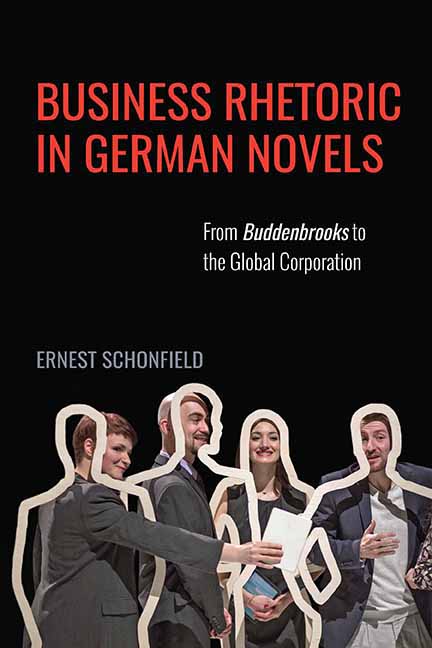Book contents
- Frontmatter
- Dedication
- Contents
- Acknowledgments
- List of Abbreviations
- Introduction
- 1 Managing Appearances in Thomas Mann's Buddenbrooks, 1901
- 2 Oratory and Publicity in Heinrich Mann's Der Untertan, 1914/18
- 3 Organizing Speech in Gabriele Tergit's Käsebier erobert den Kurfürstendamm, 1931
- 4 Seeing through the Rhetoric in Bertolt Brecht's Dreigroschenroman, 1934
- 5 Giving an Account of the Self in Ingeborg Bachmann's Malina, 1971
- 6 Negotiating Bureaucracy in Hermann Kant's Das Impressum, 1972
- 7 Corporate Discourse in Friedrich Christian Delius's Unsere Siemens-Welt, 1972
- 8 Producing Ethos in Kathrin Röggla's wir schlafen nicht, 2004
- 9 Communicative Contests in Philipp Schönthaler's Das Schiff das singend zieht auf seiner Bahn, 2013
- Conclusion
- Notes
- Bibliography
- Index
- Frontmatter
- Dedication
- Contents
- Acknowledgments
- List of Abbreviations
- Introduction
- 1 Managing Appearances in Thomas Mann's Buddenbrooks, 1901
- 2 Oratory and Publicity in Heinrich Mann's Der Untertan, 1914/18
- 3 Organizing Speech in Gabriele Tergit's Käsebier erobert den Kurfürstendamm, 1931
- 4 Seeing through the Rhetoric in Bertolt Brecht's Dreigroschenroman, 1934
- 5 Giving an Account of the Self in Ingeborg Bachmann's Malina, 1971
- 6 Negotiating Bureaucracy in Hermann Kant's Das Impressum, 1972
- 7 Corporate Discourse in Friedrich Christian Delius's Unsere Siemens-Welt, 1972
- 8 Producing Ethos in Kathrin Röggla's wir schlafen nicht, 2004
- 9 Communicative Contests in Philipp Schönthaler's Das Schiff das singend zieht auf seiner Bahn, 2013
- Conclusion
- Notes
- Bibliography
- Index
Summary
BUSINESS RHETORIC HAS contemporary relevance: think of Donald Trump's Trump: The Art of the Deal (1987), cowritten with the journalist Tony Schwartz. Trump's own career trajectory from real estate developer to TV show host to president of the United States exemplifies the many fluid interconnections among business, performance, and politics. Literary criticism can make a modest contribution to this complex interdisciplinary field. Focusing here on German-language novels and their depictions of economic activity, we have seen that rhetoric is central to business. The denials of rhetoric that we so often encounter here (Heinrich Mann's factory owner, Röggla's management consultants) are not to be taken at face value: such denials are a highly rhetorical move. The novels studied here alert readers that behind claims to be factual or impartial, there is always a political and/or economic agenda. The classical tradition of rhetoric, which still informs public relations, has often been sidelined, but these novels acknowledge the inevitability of rhetoric and the need to understand how it operates. As John Henderson points out, although Aristotle concedes that rhetoric involves manipulation, the ultimate aim of Aristotelian rhetoric is to attain the logos of reasoned debate. The teachers of rhetoric did not “wish away” the persuasive and performative aspects of oratory, but they “kept plugging the ethical into the performative.”
Many of the novels studied in this book contain set pieces in which the outcome depends upon the delivery of a public speech. In Buddenbrooks Consul Jean takes the wind out of his opponents’ sails with a few wellaimed quips delivered in Plattdeutsch; Grünlich talks his way into getting his hands on Tony's dowry; and Hanno's lack of business talent is confirmed by his failure to recite a poem. In Der Untertan the protagonist achieves success as an orator precisely because he is so good at staying within his role. Käsebier contrasts two funeral orations, the authentic and the inauthentic. The Dreigroschenroman shows that noneconomic factors can have an important bearing on business, as Macheath persuades his workforce to accept their own pauperization. In Malina the narrator frustrates her interviewer because she refuses to remain in the rhetorical place he has assigned to her.
- Type
- Chapter
- Information
- Business Rhetoric in German NovelsFrom Buddenbrooks to the Global Corporation, pp. 195 - 198Publisher: Boydell & BrewerPrint publication year: 2018



